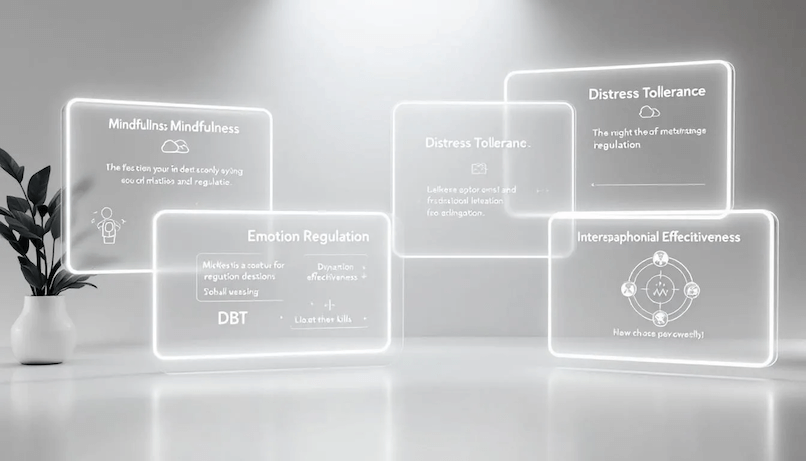Top 10 DBT Skills for Emotional Regulation and Mindfulness
DBT skills are practical techniques used in Dialectical Behavior Therapy, a method designed to help individuals manage intense emotions and improve overall mental health. Whether you’re struggling with emotional regulation or seeking to enhance your mindfulness practice, these skills offer actionable strategies to regain control. In this article, we’ll walk you through the top 10 DBT skills that can transform your emotional health and mindfulness.
Key Takeaways
DBT, developed by Marsha Linehan, combines acceptance and change techniques to help individuals with heightened emotional intensity manage their emotions more effectively.
Core mindfulness skills in DBT, such as observing, describing, and participating, enhance emotional regulation by fostering non-judgmental awareness of thoughts and feelings.
DBT has proven effective for various mental health conditions beyond Borderline Personality Disorder, improving emotional regulation and interpersonal relationships while reducing harmful behaviors.
Download our free DBT Skills Overview Pack for printable summaries and step-by-step practice tips.
Understanding Dialectical Behavior Therapy (DBT)
Dialectical Behavior Therapy (DBT) is a specialized form of talk therapy designed for individuals who experience heightened emotional intensity. Developed by Marsha Linehan in the 1970s, DBT was initially created to address issues related to Borderline Personality Disorder (BPD). The primary goal of DBT is to help individuals accept their current reality while also learning dialectical behavior therapy skills to change detrimental behaviors. This dual focus on acceptance and change is what sets dialectical behavioral therapy apart from other therapeutic approaches, and keeping a dialectical behavior therapy diary can be a useful tool in this process, especially when exploring dbt concepts.
DBT integrates cognitive behavioral treatment with additional elements such as mindfulness, acceptance, and interpersonal skills. This integration creates a comprehensive approach to emotional regulation, making DBT particularly effective for treating borderline personality disorder and other personality disorders. The therapy includes individual therapy, group skills training, and telephone coaching, typically spanning at least six months but often extending longer. This structured approach ensures that individuals receive continuous support and guidance throughout their therapeutic journey.
A notable aspect of DBT is its emphasis on gradual improvement in emotional management through structured skills training. Learning and practicing specific DBT skills helps individuals gain better control over their emotions and responses, contributing to more stable and fulfilling lives. The therapy’s structured nature, combined with its focus on both acceptance and change, makes DBT a powerful tool for those struggling with intense emotions and challenging behaviors.
Mindfulness skills form the foundation of DBT and are essential for improving emotional regulation and overall well-being. Mastering these skills is a critical step for anyone seeking better emotional management, including those working with mindfulness therapy associates.
Core Mindfulness Skills in DBT
Mindfulness skills are the cornerstone of DBT, crucial for effective emotional regulation. They increase developing awareness skills of thoughts and emotions, allowing individuals to observe them without judgment. This non-judgmental awareness helps individuals gain better control over their emotional responses and make more informed decisions.
The core mindfulness skills in DBT are:
Observing: Experiencing thoughts and feelings without labeling them, promoting a non-judgmental awareness.
Describing: Articulating one’s experiences and emotions without judgment, which aids in better self-understanding and communication.
Participating: Fully engaging in the present moment, which fosters a deeper connection with one’s experiences and enhances emotional regulation.
Daily practice of mindfulness techniques can improve emotional regulation and lower stress levels. Incorporating mindfulness based stress reduction into daily routines fosters greater self-awareness and emotional control. These skills address problems with self-identity, direction, and thought control, making them a crucial component of DBT.
Next, let’s explore distress tolerance techniques designed to help cope with difficult feelings and situations by providing accessible and clear instructions to survive painful emotions.
Distress Tolerance Techniques
Distress tolerance skills offer strategies to cope with difficult feelings and situations, equipping individuals with tools to manage crises without harmful behaviors. These techniques aim to handle overwhelming emotions and prevent harmful actions, vital for anyone dealing with intense emotions by managing pain skillfully and recognizing that distress is part of life.
One of the key dbt skills in distress tolerance techniques in DBT is the ‘STOP’ skill. This skill helps individuals pause and reflect before reacting to emotional triggers, allowing them to choose a more constructive response. Another important technique is the ‘Opposite Action’ skill, which encourages individuals to act contrary to their emotional impulses to change their emotional experience. Incorporating these strategies helps individuals manage intense emotions without resorting to harmful behaviors.
Distress tolerance skills also include practical exercises such as grounding techniques focusing on helping individuals stay present and focused during moments of distress, as outlined in the skills training manual. These techniques are essential for surviving painful emotions and maintaining emotional stability.
Now, let’s discuss emotional regulation strategies designed to help individuals manage their emotions effectively and create positive emotional experiences.
Emotional Regulation Strategies
The Emotion Regulation module in DBT teaches how to manage emotions effectively, alter unproductive emotions, and create positive experiences. Mindfulness skills, foundational to emotional regulation, help individuals identify and describe their emotions, enhancing self-awareness and understanding of emotional responses for better regulation.
Increasing positive emotions is a crucial aspect of DBT, as it helps clients build a life worth living and counteracts negative emotional states. DBT therapists employ emotion-focused strategies to help clients problem-solve and manage their emotional intensity effectively. These strategies include techniques for recognizing and managing feelings, which are essential for emotional regulation.
Incorporating emotional regulation skills into daily life significantly improves emotional well-being and overall quality of life. Effective emotion regulation reduces the impact of intense emotions, enhancing the ability to cope with life’s challenges through emotional skill building, emotional arousal, and effectively regulate emotions.
Next, let’s explore interpersonal effectiveness skills designed to help individuals interact more effectively with others.
Interpersonal Effectiveness Skills
Interpersonal effectiveness skills in DBT help individuals interact effectively, balancing personal needs and respecting others. These skills are crucial for healthy relationships and improved communication. The DEAR MAN skill aids in communicating effectively to meet needs while respecting both oneself and others.
Another important skill is the GIVE skill, which focuses on maintaining respect for oneself and others while addressing relationship needs. Utilize skills enhances communication skills development and fosters healthier relationships. Practicing them improves the ability to navigate social interactions and build stronger connections.
Interpersonal effectiveness skills are essential in DBT, helping individuals maintain healthy relationships and communicate effectively. Now, let’s discuss practical exercises for making dbt skills usable to reinforce these skills in daily life.
Practical Exercises for DBT Skill Application
DBT worksheets are valuable for learning and applying core DBT skills. They often include practical dbt exercises that teach mindfulness techniques, like observing thoughts without judgment. This structured approach aids in tracking progress and reflecting on experiences, helping individuals practice skills and measure their progress with a cognitive behavioral therapy workbook.
Setting aside specific times daily to practice DBT skills offers several advantages:
Creates routine and reinforces learning.
Many DBT exercises are structured for short sessions, making them manageable.
Reflecting on daily experiences and identifying used DBT skills enhances understanding and application.
Therapists can make worksheets more engaging by connecting them to real-life scenarios. This approach makes them feel less forced and more beneficial. Next, let’s explore how DBT can be used in group therapy, providing a structured environment for skills training and shared learning.
Using DBT in Group Therapy
DBT can be effectively used in group therapy settings, providing a structured environment for skills training. Key aspects include:
Participants practice DBT skills through shared worksheets and collective learning, enhancing understanding and application.
Group therapy allows clients to connect and share experiences.
This creates a supportive and collaborative atmosphere.
Group settings in DBT promote accountability through:
Members encouraging each other to apply skills learned in sessions.
Practicing skills in real-time.
Receiving immediate feedback from peers and therapists, which reinforces learning and provides valuable insights.
Next, let’s discuss the role of DBT therapists and their importance in guiding skills training and providing personalized support.
Role of DBT Therapists
DBT therapists play a crucial role in guiding skills training, helping clients learn emotion regulation, interpersonal effectiveness, and distress tolerance. They provide personalized guidance and support, validating client experiences during therapy while explaining dbt skills and translated dbt skills. DBT sessions incorporate structured techniques addressing emotion regulation, distress tolerance, and relationship improvement.
DBT therapists engage in regular consultation meetings to bolster their skills and manage the challenges of treating complex patients. These meetings ensure mental health professional dbt therapist are well-equipped to provide the best care for their clients, including formulation and treatment planning, as well as insights from a dbt parent coach.
Next, let’s explore the benefits of DBT for various mental health conditions and how it can improve emotional regulation and interpersonal relationships.
Benefits of DBT for Various Mental Health Conditions
DBT is recognized as an effective intervention for a range of disorders, including PTSD, eating disorders, and mood disorders. It is the only empirically validated treatment specifically for borderline personality disorder, but its effectiveness extends beyond BPD, making it valuable for various mental health conditions.
Patients in DBT have reported significant improvements in emotional regulation and interpersonal relationships. DBT has significantly decreased parasuicidal behaviors among participants, highlighting its importance as a comprehensive approach to mental health care and other mental health problems.
The benefits of DBT for various mental health conditions make it a powerful tool for enhancing emotional well-being and improving quality of life. Now, let’s provide practical tips for practicing DBT skills daily, helping individuals integrate these skills into their everyday lives.
Tips for Practicing DBT Skills Daily
Daily integration of DBT skills enhances emotional resilience and promotes a balanced life. Reminders like sticky notes or phone alerts help maintain focus on practicing DBT skills throughout the day. Positive self-talk reinforces a positive mindset and counters negative thoughts.
Professional guidance from DBT therapists is crucial for generalizing skills learned in therapy to real-life situations. Group settings in DBT promote accountability, with members encouraging each other to apply skills learned in sessions.
Consistently practicing evidence based dbt skills helps individuals develop greater emotional resilience and improve their overall well-being.
Summary
In summary, Dialectical Behavior Therapy (DBT) offers a comprehensive approach to emotional regulation and mindfulness. By understanding and practicing core DBT skills, individuals can manage their emotions more effectively, improve interpersonal relationships, and enhance their overall well-being. From mindfulness and distress tolerance to emotional regulation and interpersonal effectiveness, DBT provides valuable tools for navigating life’s challenges.
As you embark on your journey with DBT, remember that consistent practice and professional guidance are key to success. By integrating these skills into your daily life, you can achieve greater emotional resilience and build a life worth living. Embrace the power of DBT and take the first step towards a healthier, more fulfilling life.
Ready to put this into action? Grab the DBT Skills Overview Pack for at-a-glance worksheets and daily prompts you can start today.Frequently Asked Questions
What is Dialectical Behavior Therapy (DBT)?
Dialectical Behavior Therapy (DBT) is a targeted form of talk therapy that combines cognitive behavioral techniques with mindfulness and interpersonal skills to assist individuals in managing intense emotions and behaviors. It is particularly beneficial for those facing emotional challenges.
What are the core mindfulness skills in DBT?
The core mindfulness skills in DBT consist of observing, describing, and participating, which together enhance awareness of thoughts and emotions and promote full engagement in the present moment. These skills are essential for improving emotional regulation and interpersonal effectiveness.
How can distress tolerance techniques help manage overwhelming emotions?
Distress tolerance techniques help manage overwhelming emotions by offering strategies to pause and respond thoughtfully rather than react impulsively. Utilizing skills like 'STOP' and 'Opposite Action' enables individuals to navigate emotional triggers effectively, reducing the risk of harmful behaviors.
What are the benefits of DBT for mental health conditions?
DBT effectively treats various mental health conditions, notably borderline personality disorder, and significantly enhances emotional regulation and interpersonal relationships. This structured approach leads to improved overall mental well-being.
How can I practice DBT skills daily?
To practice DBT skills daily, incorporate reminders and positive self-talk into your routine, and consider seeking professional guidance. Consistent practice fosters emotional resilience and balance in your life.





